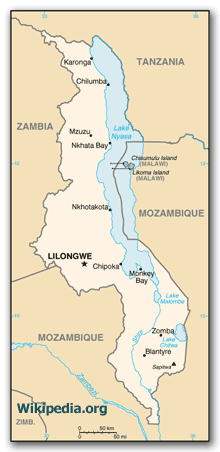Deale, Maryland – Malawi Meteorological (MET) Office and IEDRO Formulate Work Project Agreement to Provide Environmental Data Essential for the Protection of Malawi’s Citizens
 Powerful weather forecasting models are only as good as their data. To understand global climate change, it is imperative that we collect environmental data for long periods of time with representative samples from locations that span the entire planet. While industrialized nations embodying one-third of the planet have incorporated environmental data into databases, the data is spotty or missing for developing nations, as well as for seas and oceans.
Powerful weather forecasting models are only as good as their data. To understand global climate change, it is imperative that we collect environmental data for long periods of time with representative samples from locations that span the entire planet. While industrialized nations embodying one-third of the planet have incorporated environmental data into databases, the data is spotty or missing for developing nations, as well as for seas and oceans.
The International Environmental Data Rescue Organization (IEDRO) is a US-based, 501(c)(3) nonprofit organization that rescues and digitizes historic weather observations primarily in developing nations. Our efforts are supported and endorsed by the National Oceanic and Atmospheric Administration, the World Meteorological Organization and other international groups concerned with the preservation and digitization of this valuable data.
In mid-July, our Executive Director, Rick Crouthamel, visited the Republic of Malawi. One of our oldest project sites, Malawi is one of the poorest countries in the world with a gross domestic product of less than $350/person. Other than HIV, insect-borne diseases are the most significant public health problem with the most common diseases such as malaria, yellow fever, hepatitis and amoebic dysentery. These diseases are promulgated through a lack of potable water; many villagers walk 2-3 km to drink from polluted sources. Standing water during their lengthy rainy season provides breeding areas for mosquitoes and acts as a conduit for disease promulgation. Thus, the management of water resources is most important to the improvement of the Malawian’s standard of living of all.
At our data rescue site, the sorting and photographing of environmental data has been performed by volunteer Malawians. Since most staff persons work two jobs just to survive, efforts to rescue data have been very slow. To digitize the data, alpha-numeric data will need to be hand typed into tables. IEDRO and the Malawi Department of Climate Change and Meteorological Services (called the Met) have drafted an agreement to pay Met staff to key alpha-numeric data. A start-up project will be developed at IEDRO Headquarters in Deale, MD to establish a prototype.
Once programming and processes are established, IEDRO will locate operations in Malawi under the management of the Malawi Meteorological Office.
When completed, IEDRO return the data in useable format to the Malawi government, and will provide advice and training to the government of Malawi in the use the information for the protection of its citizens, its local industries and its farmers. Rescuing this data could potentially enable Malawi to:
- Improve community planning; change requirements for constructing and reinforcing buildings, bridges and public services to withstand predicted severe weather; and develop severe weather forecasting and warning systems.
- Educate rural agricultural and development planners of the real frequency of drought, show them how to plant more appropriate crops and save some of their production for the famine years to prevent malnourishment and starvation.
Only with accurate information about the past, can we make the necessary preparations for the future. With historic weather data we can conduct climate change research, forecast the spread of disease, and improve flood forecasting. Rescuing historic environmental data can do more to prevent human suffering and death than any other endeavor in the 21st century.

Comments are closed.